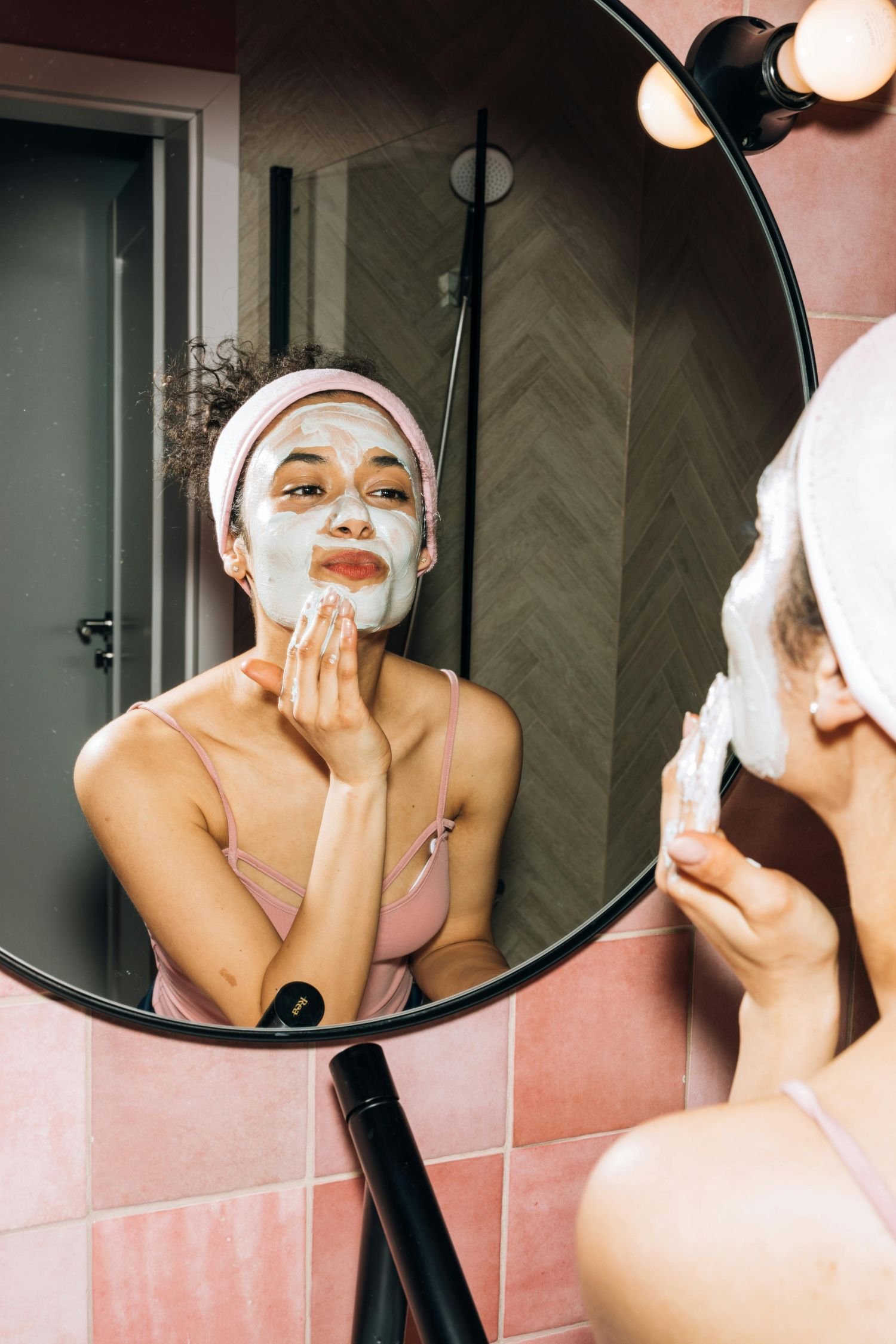Nutrition & Skin Health
Photo by puhhha from Getty Images
Nutrition is essential to maintaining overall bodily health, including the vitality and health of our skin. We tend to treat our skin from the outside, but true skin health needs internal support as well.
To achieve glowing skin, let’s look at key nutrients for skin health, along with some food and lifestyle tips to dote on our skin from the inside out.
Understanding skin
Our skin, the body's largest organ, serves as a vital shield for all our internal organs, acting as the first line of defence against environmental elements. It’s made up of 3 distinct layers: the epidermis (the outer layer), the dermis (the middle layer), and the hypodermis (the deepest layer).
Skin performs a variety of essential functions, including regulating body temperature, facilitating sensory perception (such as touch, pain, and temperature), allowing for movement, and providing protection against dehydration, ultraviolet (UV) radiation, physical trauma, pathogens, microorganisms, and toxins.
Factors influencing skin health
Our skin health is influenced by a combination of internal and external factors:
Internal Factors:
Genetics
Hormones
Aging
External Factors:
Skincare routines
Diet
Lifestyle choices (such as stress and sleep)
Environmental influences (including pollution and UV exposure)
While internal factors are largely beyond our control, external factors offer us the opportunity to make positive changes that can significantly enhance the health and appearance of our skin.
Nutrition for healthy skin
Nutrition plays a key role in skin health, and it’s one of the external factors we can actively control. Poor nutrition can lead to inflammation, breakouts, and premature ageing of the skin. By embracing a balanced diet rich in antioxidants, vitamins, and minerals, we can promote optimal skin health.
So, let’s explore the nutrients that are important for maintaining optimal skin health and function:
Protein
Collagen, elastin and keratin are proteins that are essential for the structure and strength of our skin, hair, and nails. We need dietary proteins to provide amino acids (building blocks) for the production and repair of these proteins, ensuring healthy skin tissue.
Sources:
Meat and poultry
Fish
Eggs
Dairy products
Beans and pulses
Nuts and seeds
Soy products (tofu, edamame, tempeh)
Omega-3
Omega-3 fatty acids are found in the epidermis (outer layer), where they help form the skin’s barrier and retain moisture. They also have anti-inflammatory properties that can reduce the severity of acne and sensitivity to sun damage.
Sources:
Oily fish (salmon, sardines, mackerel, herring, trout)
Pumpkin seeds
Walnuts
Green leafy vegetables
Soybeans and soy milk
Flaxseeds and linseeds
Vitamin A
As a powerful antioxidant, vitamin A protects cells from damage caused by free radicals, which can break down collagen and accelerate ageing. It also supports the growth and development of new skin cells and offers protection against sun damage.
It’s important to know that too little vitamin A can affect the skin, but too much vitamin A can also be harmful to the skin, such as when taking a high-dose supplement.
Sources:
Dairy products
Eggs
Salmon
Green leafy vegetables
Carrots
Peppers
Sweet potatoes
Apricots
Mangoes
Vitamin C
Vitamin C is abundant in the skin and is essential for making and maintaining collagen - a protein that helps to maintain the skin’s structure and strength. It also plays an important role in wound healing and acts as an antioxidant to protect against free radical damage.
Sources:
Kiwi
Berries
Citrus fruits
Bell peppers
Broccoli
Cauliflower
Brussels sprouts
Vitamin E
A potent antioxidant, vitamin E protects skin cells from damage and supports wound healing. It also has anti-inflammatory properties and may offer some protection against UV rays.
Sources:
Nuts and seeds
Leafy green vegetables
Salmon
Egg yolk
Avocado
Oils (sunflower, rapeseed, olive)
Selenium
Selenium is a powerful antioxidant that protects the skin from free radical damage and helps combat ageing induced by UVB radiation.
Sources:
Meat and poultry
Seafood
Eggs
Dairy products
Brazil nuts
Seeds
Whole grains
Zinc
Zinc is abundant in the skin and is crucial for its structure and function. It supports skin regeneration and healing, acts as an antioxidant, protects against damage caused by UVs, and helps control excess oil, which can help with acne management.
Sources:
Meat and poultry
Fish
Dairy products
Beans
Nuts
Whole grains
Hydration
Proper hydration is important for healthy skin. Getting enough liquids helps maintain the balance of tissue functions and can reduce dryness and roughness.
Fluids to Consider:
Water
Sparkling water
Milk
Smoothies
Fruit juices
Tea and coffee
Limit sugary drinks to one small glass per day to avoid excess added sugars. Additionally, hydrating fruits and vegetables like oranges, melons, cucumbers, and tomatoes contribute to fluid intake while providing essential vitamins and minerals.
By focusing on these key nutrients and maintaining proper hydration, you can support your skin's health and vitality.
Tips to nourish our skin
Embrace variety - incorporate a diverse range of foods into your diet. No single food or food group can provide all the essential nutrients your skin needs for optimal health.
Eat the rainbow - fill your plate with colourful fruits and vegetables. Each fruit and vegetable offers unique nutrients and antioxidants that support skin health, so aim for a wide spectrum to maximise benefits.
Stay hydrated - make sure you are drinking enough liquids throughout the day. Proper hydration is crucial for maintaining soft, supple skin and supporting overall skin function.
Limit alcohol - alcohol can lead to dehydration, which negatively affects your skin. Try to consume alcohol within sensible low-risk limits - not just for the sake of your skin, but for your overall well-being.
Protect your skin - while this isn’t a nutrition tip, it’s essential for skin health. Always use sunscreen and take precautions to avoid sunburn, as protecting your skin from UV damage is vital for maintaining its health and appearance.
What’s the take-home?
The skin’s vital role - As our largest organ, the skin serves multiple essential functions, with its primary role being to protect our body and vital organs.
Nutrients matter - nutrition can significantly have an impact on our skin health. Key nutrients to focus on include proteins, omega-3 fatty acids, and vitamins A, C, E, selenium, and zinc.
Hydration is essential - staying well-hydrated is important for maintaining skin balance and preventing dryness, contributing to a healthy complexion.
Embrace a balanced diet - a varied and balanced diet is the most effective way to nourish your skin from within, providing the diverse nutrients it needs to thrive.
Check out these other Nutrition & Lifestyle posts…
References
Lopez-Ojeda W, Pandey A, Alhajj M, et al. Anatomy, Skin (Integument) [Updated 2022 Oct 17]. In: StatPearls [Internet]. Treasure Island (FL): StatPearls Publishing; 2023 Jan-. Available from: https://www.ncbi.nlm.nih.gov/books/NBK441980/
Addor FAS. Beyond photoaging: additional factors involved in the process of skin ageing. Clin Cosmet Investig Dermatol. 2018 Sep 20;11:437-443. doi: 10.2147/CCID.S177448.
Parke MA, Perez-Sanchez A, Zamil DH, Katta R. Diet and Skin Barrier: The Role of Dietary Interventions on Skin Barrier Function. Dermatol Pract Concept. 2021 Jan 29;11(1):e2021132. doi: 10.5826/dpc.1101a132.
Pappas A., Liakou A., Zouboulis C.C. Nutrition and skin. Rev Endocr Metab Disord. 2016; 17, 443–448. https://doi.org/10.1007/s11154-016-9374-z
Esther Boelsma and others, Nutritional skin care: health effects of micronutrients and fatty acids, The American Journal of Clinical Nutrition, Volume 73, Issue 5, May 2001, Pages 853–864, https://doi.org/10.1093/ajcn/73.5.853
VanBuren CA, Everts HB. Vitamin A in Skin and Hair: An Update. Nutrients. 2022 Jul 19;14(14):2952. doi: 10.3390/nu14142952.
Pullar JM, Carr AC, Vissers MCM. The Roles of Vitamin C in Skin Health. Nutrients. 2017; 9(8):866. https://doi.org/10.3390/nu9080866
Nachbar, F., Korting, H.C. The role of vitamin E in normal and damaged skin. J Mol Med 73, 7–17 (1995). https://doi.org/10.1007/BF00203614
Michalak, M.; Pierzak, M.; Kr˛ecisz, B.; Suliga, E. Bioactive Compounds for Skin Health: A Review. Nutrients 2021, 13, 203. https://doi.org/10.3390/nu13010203











